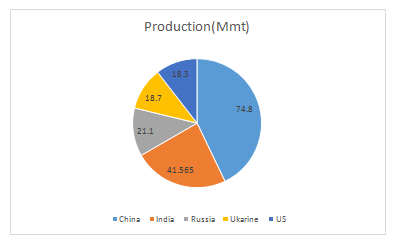Sumitomo Chemical has successfully addressed the problems faced by the potato cultivators of Punjab. There has been an increase in the incidence of the black scurf of potato. Punjab alone, has witnessed an increase in incidence of this disease by 12% as compared to the last year. The disease commonly affects the tubers, sprouts, stems and stolons. The most common symptom is black scurf comprising of dark brown to black irregular lumps sticking on the surface of tubers. These irregular lumps are closely adhered to the tuber surface and do not wash off easily. Other symptoms on the tuber include skin cracks, crater like depressions, pitting, stem-end necrosis and shape deformity. The disease often causes sprout injury both in storage and in fields after planting. The affected sprouts show discoloration of tissue. The heavily infected sprouts cannot emerge from soil leading to gappy germination.The emerging sprouts when infected later develop cankers causing girdling of stem bases. Such affected plants show upward rolling of leaves with pinkish or purplish margin. Often small green or reddish aerial tubers are also formed in the axils. The infection also spreads to roots and developing stolons resulting in rotting of cortical tissues. Such infected roots later shed away hence infected plants have poor root system. Infected stolons give rise to deformed tubers.
Till date the following chemicals are used for the control of black scurf in potato:
- Emison + Carbendazim
- Boric Acid + Carbendazim
- Monceron
Sumitomo Chemical introduces a new product "Validacin" to combat this deadly disease. Validacin is a Japanese product meant for Rhizoctonia solani. It is different from other products available in the market because it is systemic in nature, while others are contact in nature. Validamycin 3%
L is both systemic fungicide and antibiotic. It is the best solution for control of Rhizoctonia fungus.
Key features:
- Lesser cost as compared to existing
- Longer effect
- No residue in crop as well as soil
- Bio Pesticide & Eco Friendly
- Non Toxic to beneficial insects & Human
- Real Natural Systemic fungicide and Antibiotic
Validacin pricing:
- Market Price: Rs. 500/ltr
- QUANTITY DISCOUNTS –10 RS ON 1000 LTRS. –20 RS ON 2000 LTRS.
Mode of action:
The chemical is absorbed by the cells of the pathogenic fungus as nutrilite
and transmitted through the hyphae (filaments which constitute body of
fungus), whose growth is affected as soon as the contact with the active ingredient is established. This makes the hyphal top abnormal and inhibits the growth of the hypha through inhibiting the synthesis of inositol which is the essential for the growth
of the fungi.
Comparison:
Method of application:
1. As a spray: 250
ml per pump Validacin spray on 6-7 Qtls potato, change the side and then spray
once more with the new solution of same dose and dry it in shade.
2. As a dip: 250 ml per 100 Ltr of
water dipping for 6-7 Qtls and dry it in shade.
How is an antibiotic an Edge with Validacin?
> Antibiotics are
chemicals that are used to treat infections caused by bacteria and other organisms like parasites, and fungi e.g. Streptomycin.
> They either kill
bacteria or keep them from reproducing.
> Chemical substance
that in dilute solutions can inhibit the growth of harmful microorganisms also.
So
with Validacin we are having an edge of Systemic on all the existing contact
fungicide as well as of Antibiotic too.
#These blogs were written as a part of the internship program at Sumitomo Chemicals.















